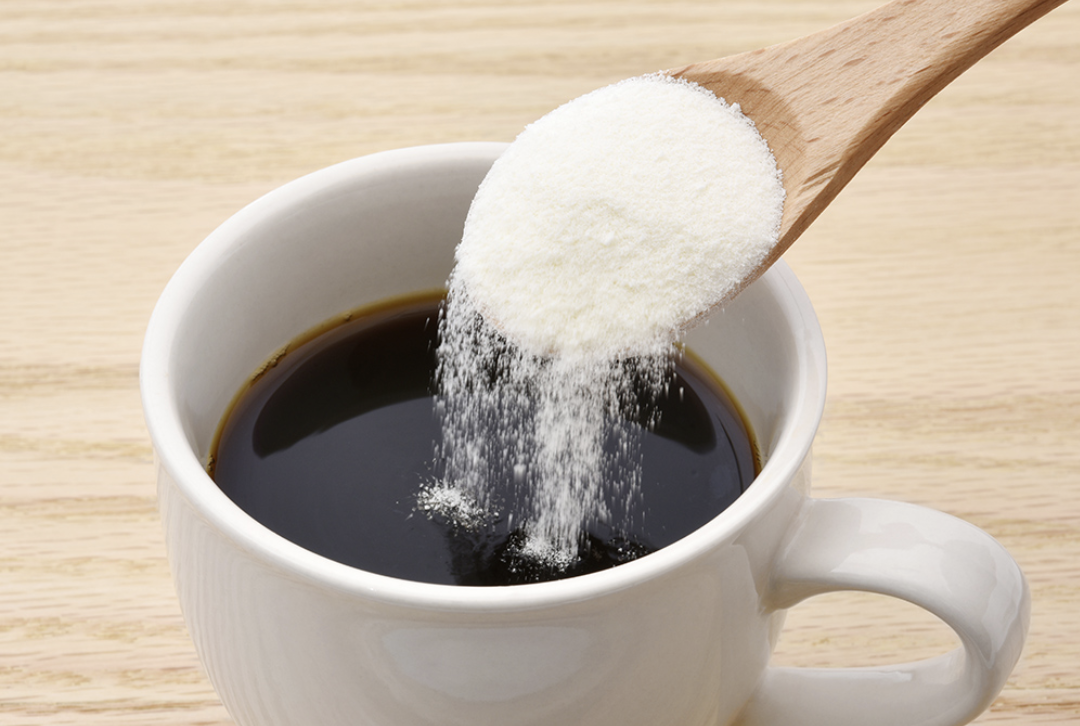
Collagen makes up about one-third of the protein content in our bodies and is mostly found in fibrous tissues such as our skin, tendons, ligaments, but is also dispersed throughout the rest of our bodies.
The process of collagen production in our bodies starts with two amino acids: glycine and proline. Vitamin C is a critical component of this process – without adequate amounts of it, collagen synthesis cannot happen.
As we get older, the amount of collagen held in our bodies decreases at a rate of about 1% per year, after our late twenties. The idea of taking supplemental collagen is relatively new, but research is promising in regard to the improvement of skin, joints, and bone health.
Benefits of supplemental collagen:
Consuming collagen regularly can have aesthetic benefits by improving the elasticity and moisture in our skin and in turn minimizing wrinkles caused by dry, loose skin. As well, collagen supplements has been shown to reduce inflammation and stimulate collagen synthesis in the body. This may help promote pain relief among people with joint disorders like osteoarthritis. Boosting muscle mass and reducing the risk factors associated with heart conditions are additional bonuses.
Maintaining our natural collagen:
Although supplemental collagen has shown to be a healthy addition to one’s lifestyle, it is also a good idea to maintain our body’s own collagen as best we can. To minimize the deterioration of our naturally produced collagen, it is best to avoid consuming too much added sugars and refined carbs, protecting our skin from excessive sun exposure, and not smoking. In addition, ensuring that we are receiving enough Vitamin C is crucial, due to its major role in collagen production; the RMI for adults is 65-90mg per day.
Collagen Q & A
How often can you take collagen?
Collagen peptides (supplements) are very safe and you can take it every single day if you want. Most supplements will be in a range of 10-15 grams of collagen per scoop. You can safely take 1-2 scoops per day.
Why does the body lose it over time?
Collagen is the protein involved with skin strength and elasticity. As we age, our body naturally produces less collagen. Time simply slows down collagen production. Other reasons that can contribute to collagen loss include exposure to UV light, smoking, caffeine and excess intake of sugar.
What is the difference between collagen and protein powder?
This could be a few questions, because there are also many different types of protein powder like pea, rice, soy, whey, casein, etc. Let’s focus on the most common – whey protein. The amino acid profile is the main differentiator between the two.
Collagen protein is mostly made up of the three amino acids glycine, proline, and hydroxyproline. These amino acids support the health of our connective tissue (ligaments, tendons, etc.), skin, nails and hair.
Whey protein is a complete protein, meaning it contains all nine essential amino acids. Whey protein isolate supplements go through a purification process to filter out fat, lactose, and carbohydrates. One of the main amino acids in whey protein is Leucine, which has the ability to stimulate muscle protein synthesis.
What is better, pills or powder format and are there any side effects?
We’re always a fan of powder over pills when it comes to vitamins and supplements when possible as many people have challenges digesting things, making the potential to break down the pill more difficult than the pure powder. That being said, if your adherence is better to consistently taking your collagen supplement in a pill form, use the pill!
Collagen doesn’t often cause any side effects, but research has shown some people have digestive issues when taking collagen.
Are there plant based collagen sources or is it always animal?
On the market there are animal/marine and plant-based collagen supplements. A few questions ago, we discussed the amino acid profile of collagen. Since these amino acids come from animals, plant based collagen is made by used genetically modified yeast and bacteria. We’re fans of natural ingredients over genetically modified ones. On the market right now, there are a lot of “plant-based collagen boosters.” Don’t be confused that these are the same quality as collagen in terms of protein. Many don’t even have any protein in them.
Is marine collagen as effective?
Yes, marine collagen will provide the same benefits of bovine collagen (from beef).
Does the quality differ between brands?
There will always be supplement brands that are superior in regards to production and ingredients. Some of our favourite brands for collagen include Sproos, Progressive, and Vital Proteins.
Is it similar to Biotin?
Biotin is also known as vitamin B7. It offers a few similar benefits to collagen including hair and skin health and maintenance. Collagen, as we know now, is a structural protein. So, biotin and collagen are very different, but both important and work together in our body.
Is it safe to take while breastfeeding?
We know there are lots of benefits to taking collagen at various life stages. Natural products and supplements are a tricky topic in respect to safety during pregnancy and breastfeeding due to the lack of research. We always take a neutral stance and do not direct clients to take them, or ensure they check with their doctor before beginning supplementation.
Sources: https://www.healthline.com/nutrition/collagen#collagen-damaging-behaviors https://www.pranin.com/blog/vitamin-c-and-collagen/#:~:text=Without%20adequate%20amounts%20of%20dietary,actually%20form%20or%20store%20collagen.&text=This%20makes%20vitamin%20C%20a%20mandatory%20co%2Dfactor%20in%20collagen%20synthesis.&text=It’s%20responsible%20for%20holding%20cells%20together%20during%20the%20creation%20of%20collagen.&text=This%20is%20one%20of%20the,to%20be%20a%20vanity%20vitamin. https://www.healthline.com/nutrition/collagen-benefits#The-bottom-line
Leave a Comment
You must be logged in to post a comment.



0 Comments